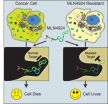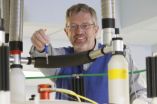(Press-News.org) A Harvard archaeologist has dramatically simplified the process of finding early human settlements by using computers to scour satellite images for the tell-tale clues of human habitation, and in the process uncovered thousands of new sites that might reveal clues to the earliest complex human societies.
As described in a paper published March 19 in the Proceedings of the National Academy of Sciences, Jason Ur, the John L. Loeb Associate Professor of the Social Sciences, worked with Bjoern Menze, a research affiliate in MIT's Computer Science and Artificial Intelligence Laboratory to develop a system that identified settlements based on a series of factors – including soil discolorations and the distinctive mounding that results from the collapse of mud-brick settlements.
Armed with that profile, Ur used a computer to examine satellite images of a 23,000 square-kilometer area of north-eastern Syria, and turned up approximately 9,000 possible settlements, an increase of "at least an order of magnitude" over what had previously been identified.
"I could do this on the ground," Ur said, of the results of the computer-aided survey. "But it would probably take me the rest of my life to survey an area this size. With these computer science techniques, however, we can immediately come up with an enormous map which is methodologically very interesting, but which also shows the staggering amount of human occupation over the last 7,000 or 8,000 years.
"What's more, anyone who comes back to this area for any future survey would already know where to go," he continued. "There's no need to do this sort of initial reconnaissance to find sites. This allows you to do targeted work, so it maximizes the time we have on the ground."
### END
Spotting ancient sites, from space
Harvard archaeologist uses computers and satellite images to search for early human settlements
2012-03-20
ELSE PRESS RELEASES FROM THIS DATE:
Sanford-Burnham scientists unravel cancer drug's secret to resistance
2012-03-20
LA JOLLA, Calif., March 19, 2012 – Drug resistance is a serious problem for cancer patients—over time, a therapy that was once providing some benefit simply stops working. Scientists at Sanford-Burnham Medical Research Institute (Sanford-Burnham) recently discovered how cancer cells develop resistance to a drug called MLN4924. This experimental therapy is currently being tested in a number of Phase I and Phase I/II clinical trials to determine its efficacy against several different types of cancer, including multiple myeloma, leukemia, and lymphoma.
Published online March ...
Solving the mystery of blood clotting
2012-03-20
How and when our blood clots is one of those incredibly complex and important processes in our body that we rarely think about. If your blood doesn't clot and you cut yourself, you could bleed to death, if your blood clots too much, you could be in line for a heart attack or stroke. Dr. Hans Vogel, a professor at the University of Calgary, has thought a lot about blot clotting and recently published research in the prestigious Journal of the American Chemical Society that helps to better understand the clotting process.
Vogel and his graduate student Hao Huang were able ...
Smell is a symphony
2012-03-20
Just like a road atlas faithfully maps real-word locations, our brain maps many aspects of our physical world: Sensory inputs from our fingers are mapped next to each other in the somatosensory cortex; the auditory system is organized by sound frequency; and the various tastes are signaled in different parts of the gustatory cortex.
The olfactory system was believed to map similarly, where groups of chemically related odorants - amines, ketones, or esters, for example - register with clusters of cells that are laid out next to each other.
When researchers at the Stowers ...
Scientists develop a software tool for estimating heart disease risk
2012-03-20
University of Granada researchers have developed a software tool that makes an accurate estimation of the risk that a person has to suffer a heart disease. In addition, this software tool allows the performance of massive risk estimations, i.e. it helps estimating the risk that a specific population group has of suffering a heart condition. The researchers employed a sample including 3 000 patients.
Heart conditions increasingly affect working age population, which can make individuals loss potential years of work and productivity.
Understanding the risk for ...
Empowered citizens or hopeful bystanders?
2012-03-20
The new political appetite for 'localism' in town planning has triggered anxiety within local communities and amongst those charged with making it work, according to new research funded by the Economic and Social Research Council (ESRC).
A study led by Professor Nick Gallent of the Bartlett School of Planning, University College London, looked at how communities in Kent have sought to influence the policies of local authorities and service providers and how, in the recent past, they have engaged with planning professionals around the production of 'parish plans'. The ...
First complete full genetic map of promising energy crop
2012-03-20
Researchers in Wales and the United States have collaborated to complete the first high-resolution, comprehensive genetic map of a promising energy crop called miscanthus. The results – published in the current edition of the peer-reviewed, online journal PLoS One – provide a significant breakthrough towards advancing the production of bioenergy.
The breakthrough results from the long-term collaboration between energy crop company Ceres, Inc., based in Thousand Oaks, California, USA, and the Institute of Biological, Environmental and Rural Sciences (IBERS) at Aberystwyth ...
Lifestyle study highlights key differences in relapsing and progressive onset MS
2012-03-20
Patients with relapsing onset Multiple Sclerosis (MS) who consumed alcohol, wine, coffee and fish on a regular basis took four to seven years longer to reach the point where they needed a walking aid than people who never consumed them. However the study, published in the April issue of the European Journal of Neurology, did not observe the same patterns in patients with progressive onset MS.
The authors say that the findings suggest that different mechanisms might be involved in how disability progresses in relapsing and progressive onset MS.
Researchers asked patients ...
Scientists develop tools to make more complex biological machines from yeast
2012-03-20
Scientists are one step closer to making more complex microscopic biological machines, following improvements in the way that they can "re-wire" DNA in yeast, according to research published today in the journal PLoS ONE.
The researchers, from Imperial College London, have demonstrated a way of creating a new type of biological "wire", using proteins that interact with DNA and behave like wires in electronic circuitry. The scientists say the advantage of their new biological wire is that it can be re-engineered over and over again to create potentially billions of connections ...
Researchers develop blueprint for nuclear clock accurate over billions of years
2012-03-20
A clock accurate to within a tenth of a second over 14 billion years – the age of the universe – is the goal of research being reported this week by scientists from three different institutions. To be published in the journal Physical Review Letters, the research provides the blueprint for a nuclear clock that would get its extreme accuracy from the nucleus of a single thorium ion.
Such a clock could be useful for certain forms of secure communication – and perhaps of greater interest – for studying the fundamental theories of physics. A nuclear clock could be as much ...
Soy-based S-equol supplement reduces metabolic syndrome risk factors
2012-03-20
Washington, DC. (March 19, 2012) – A 12-week treatment of the fermented soy germ-based nutritional supplement containing S-equol significantly lowered hemoglobin A1c (HbA1c), LDL cholesterol and improved vascular stiffness, all factors that occur as part of metabolic syndrome, according to a first-of-its-kind peer-reviewed study reported in a poster at the Women's Health 2012 annual meeting.
"This study is the first to provide evidence that a daily supplement of soy-based S-equol favorably change metabolic syndrome risk factors, particularly in women. Because not all ...
LAST 30 PRESS RELEASES:
Under the Lens: Microbiologists Nicola Holden and Gil Domingue weigh in on the raw milk debate
Science reveals why you can’t resist a snack – even when you’re full
Kidney cancer study finds belzutifan plus pembrolizumab post-surgery helps patients at high risk for relapse stay cancer-free longer
Alkali cation effects in electrochemical carbon dioxide reduction
Test platforms for charging wireless cars now fit on a bench
$3 million NIH grant funds national study of Medicare Advantage’s benefit expansion into social supports
Amplified Sciences achieves CAP accreditation for cutting-edge diagnostic lab
Fred Hutch announces 12 recipients of the annual Harold M. Weintraub Graduate Student Award
Native forest litter helps rebuild soil life in post-mining landscapes
Mountain soils in arid regions may emit more greenhouse gas as climate shifts, new study finds
Pairing biochar with other soil amendments could unlock stronger gains in soil health
Why do we get a skip in our step when we’re happy? Thank dopamine
UC Irvine scientists uncover cellular mechanism behind muscle repair
Platform to map living brain noninvasively takes next big step
Stress-testing the Cascadia Subduction Zone reveals variability that could impact how earthquakes spread
We may be underestimating the true carbon cost of northern wildfires
Blood test predicts which bladder cancer patients may safely skip surgery
Kennesaw State's Vijay Anand honored as National Academy of Inventors Senior Member
Recovery from whaling reveals the role of age in Humpback reproduction
Can the canny tick help prevent disease like MS and cancer?
Newcomer children show lower rates of emergency department use for non‑urgent conditions, study finds
Cognitive and neuropsychiatric function in former American football players
From trash to climate tech: rubber gloves find new life as carbon capturers materials
A step towards needed treatments for hantaviruses in new molecular map
Boys are more motivated, while girls are more compassionate?
Study identifies opposing roles for IL6 and IL6R in long-term mortality
AI accurately spots medical disorder from privacy-conscious hand images
Transient Pauli blocking for broadband ultrafast optical switching
Political polarization can spur CO2 emissions, stymie climate action
Researchers develop new strategy for improving inverted perovskite solar cells
[Press-News.org] Spotting ancient sites, from spaceHarvard archaeologist uses computers and satellite images to search for early human settlements



